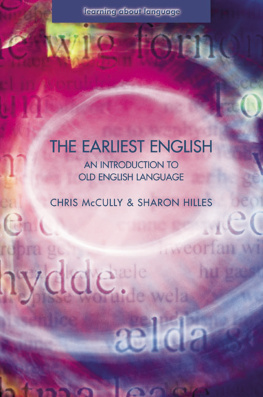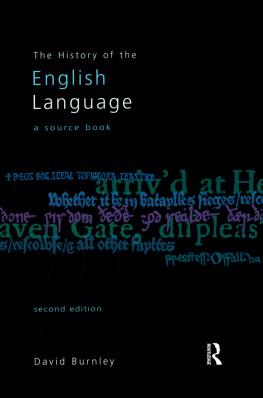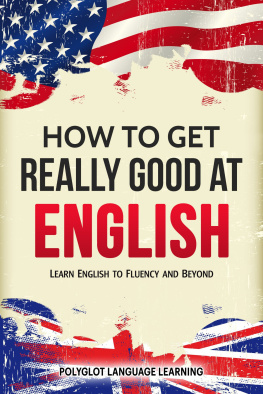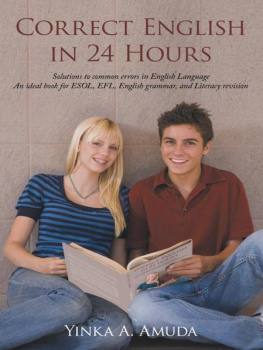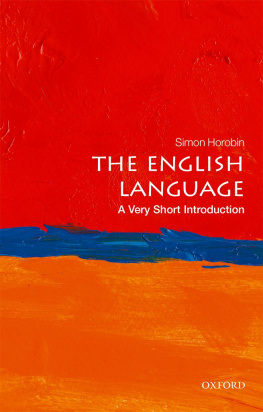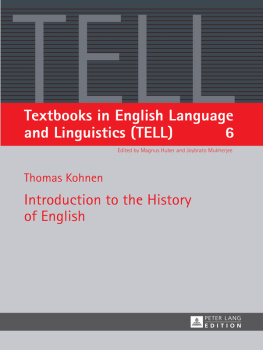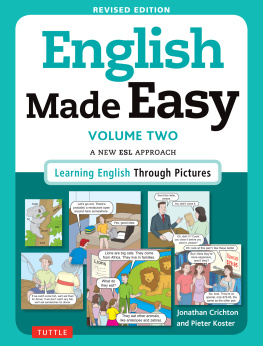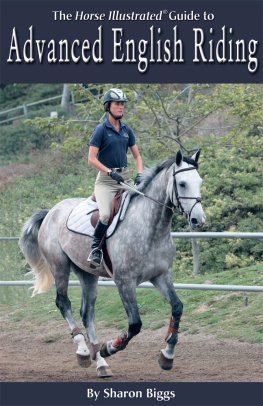Hilles Sharon - The earliest English: an introduction to Old English language
Here you can read online Hilles Sharon - The earliest English: an introduction to Old English language full text of the book (entire story) in english for free. Download pdf and epub, get meaning, cover and reviews about this ebook. City: London [England];New York, year: 2014, publisher: Taylor & Francis Group;Routledge, genre: Children. Description of the work, (preface) as well as reviews are available. Best literature library LitArk.com created for fans of good reading and offers a wide selection of genres:
Romance novel
Science fiction
Adventure
Detective
Science
History
Home and family
Prose
Art
Politics
Computer
Non-fiction
Religion
Business
Children
Humor
Choose a favorite category and find really read worthwhile books. Enjoy immersion in the world of imagination, feel the emotions of the characters or learn something new for yourself, make an fascinating discovery.
- Book:The earliest English: an introduction to Old English language
- Author:
- Publisher:Taylor & Francis Group;Routledge
- Genre:
- Year:2014
- City:London [England];New York
- Rating:4 / 5
- Favourites:Add to favourites
- Your mark:
- 80
- 1
- 2
- 3
- 4
- 5
The earliest English: an introduction to Old English language: summary, description and annotation
We offer to read an annotation, description, summary or preface (depends on what the author of the book "The earliest English: an introduction to Old English language" wrote himself). If you haven't found the necessary information about the book — write in the comments, we will try to find it.
Hilles Sharon: author's other books
Who wrote The earliest English: an introduction to Old English language? Find out the surname, the name of the author of the book and a list of all author's works by series.
The earliest English: an introduction to Old English language — read online for free the complete book (whole text) full work
Below is the text of the book, divided by pages. System saving the place of the last page read, allows you to conveniently read the book "The earliest English: an introduction to Old English language" online for free, without having to search again every time where you left off. Put a bookmark, and you can go to the page where you finished reading at any time.
Font size:
Interval:
Bookmark:

The Earliest English
LEARNING ABOUT LANGUAGE
General Editors:
Geoffrey Leech & Mick Short, Lancaster University
Already published:
Analysing Sentences (2nd edition) Noel Burton-Roberts
Words and Their Meaning Howard Jackson
An Introduction to Phonology Francis Katamba
Grammar and Meaning Howard Jackson
An Introduction to Sociolinguistics (2nd edition) Janet Holmes
Realms of Meaning: An Introduction to Semantics Th. R. Hofmann
An Introduction to Psycholinguistics Danny D. Steinberg
An Introduction to Spoken Interaction Anna-Brita Stenstrm
Watching English Change Laurie Bauer
Meaning in Interaction: An Introduction to Pragmatics Jenny Thomas
An Introduction to Cognitive Linguistics Friedrich Ungerer and Hans-Jrg Schmid
Exploring the Language of Poems, Plays and Prose Mick Short
Contemporary Linguistics: An Introduction William OGrady, Michael Dobrovolsky and Francis Katamba
An Introduction to Natural Language Processing Through Prolog Clive Matthews
An Introduction to Child Language Development Susan Foster-Cohen
The Sounds of Language: An Introduction to Phonetics Henry Rogers
An Introduction to Foreign Language Learning and Teaching Keith Johnson
Varieties of Modern English Diane Davies
Patterns of Spoken English Gerald Knowles
The Earliest English Chris McCully and Sharon Hilles
The Earliest English
An Introduction to Old English Language
Chris McCully and Sharon Hilles

First published 2005 by Pearson Education Limited
Published 2014 by Routledge
2 Park Square, Milton Park, Abingdon, Oxon OX14 4RN
711 Third Avenue, New York, NY 10017, USA
Routledge is an imprint of the Taylor & Francis Group, an informa business
Copyright 2005, Taylor & Francis.
The rights of Chris McCully and Sharon Hilles to be identified as authors of this work have been asserted by them in accordance with the Copyright, Designs and Patents Act 1988.
All rights reserved. No part of this book may be reprinted or reproduced or utilised in any form or by any electronic, mechanical, or other means, now known or hereafter invented, including photocopying and recording, or in any information storage or retrieval system, without permission in writing from the publishers.
Notices
Knowledge and best practice in this field are constantly changing. As new research and experience broaden our understanding, changes in research methods, professional practices, or medical treatment may become necessary.
Practitioners and researchers must always rely on their own experience and knowledge in evaluating and using any information, methods, compounds, or experiments described herein. In using such information or methods they should be mindful of their own safety and the safety of others, including parties for whom they have a professional responsibility.
To the fullest extent of the law, neither the Publisher nor the authors, contributors, or editors, assume any liability for any injury and/or damage to persons or property as a matter of products liability, negligence or otherwise, or from any use or operation of any methods, products, instructions, or ideas contained in the material herein.
ISBN 13: 978-0-582-40474-8 (pbk)
British Library Cataloguing-in-Publication Data
A CIP catalogue record for this book can be obtained from the British Library
Library of Congress Cataloging-in-Publication Data
McCully, C. B.
The earliest English : an introduction to the English language from the beginnings to the twelfth century / Chris McCully and Sharon Hilles.
p. cm. (Learning about language)
Includes bibliographical references and index.
ISBN 0-582-40474-6 (pbk.)
1. English languageOld English, ca. 450-1100. 2. English languageOld English, ca. 450-1100Grammar. 3. English languageMiddle English, 1100-1500. I. Hilles, Sharon. II. Title. III. Series.
PE135.M23 2004
429'.82dc22
2004050356
Set by 35 in 10/12.5pt Palatino
Contents
Of making many books there is no end. wrote the poet of Ecclesiastes, and (he added, with all the professional weariness of a scholar) much study is a weariness of the flesh. On the other hand, the making of this book was attended by both luck and good fortune, and they made the weariness of the flesh almost a delight. First, wed like to thank Richard Hogg, of the University of Manchester, who, more years ago than seems decent to mention, unwittingly began this project with three pamphlets hed originally intended for the use of his first-year Old English students. Richards work eventually was developed into his Introduction to Old English (2002). Some of the early units here contain one or two expansions, or re-presentations, of Richards original texts and ideas, and while we hope he forgives our reinterpretations of his work, we hope he will find the current text worthy of his plans, and consistent with them. In the same departmental context, some of the material we introduce in Unit 8 owes its existence to a teaching pamphlet originally prepared by Carole Weinberg and David Denison, though they cant have foreseen the redeployment of their work on the Peterborough Chronicle in quite the present format. We are grateful to them, and again to Richard Hogg, for allowing us to make use of some of the original questions they posed on the language of the 1137 and 1140 entries in the Chronicle. Second, Olga Fischer saw a very early draft version of the text and made many suggestions for improvement in both conception and detail. We thank her, and her students at the Universiteit van Amsterdam, for having worked with the pre-original version, and for having been so generous with their time and comments. We are also grateful to have discussed, with both Olga and with Nikolaus Ritt, of the University of Vienna, some of the ideas that eventually brought some of this text into its current shape. Third, we thank Mary Ellen Ryder, of Boise State University, who reviewed the proposal that underlay this text, for having commented at such length, and so constructively, about it. Fourth, we thank Professor Wilhelm Busse, of the University of Dsseldorf, who allowed us to make use of some tables of Old English inflections that were originally developed for a Workbook he and his colleagues used until recently with their Old English students, and we thank, too, Noel Burton-Roberts for his permission to allow us to adapt the lay-out of some tables that were designed for use many years ago in the School of English at the University of Newcastle-upon-Tyne. We also thank those other colleagues with whom weve been privileged to discuss some of the issues contained in the text. Among these faces and voices are Donka Minkova, Roger Lass, Bob Stockwell, Ricardo Bermdez-Otero, Heinz Giegerich and Paula Fikkert. Monika Schmid, of the Vrije Universiteit, Amsterdam, functioned simultaneously as critic, proofreader, library contact and source of many constructive ideas for setting the text, particularly the fiddly parts. Osamu Koma, Honorary Research Fellow in the University of Manchester (200203), painstakingly spotted some typos and other errors in Unit 5. Two readers for Pearson Education made very detailed and critical comments on the penultimate draft of the text, and we are greatly obliged to them for requiring us to cut or to simplify some of our analyses and reorder several sections of our draft. In the publishing context, Melanie Carter and Helen MacFadyen handled one very complicated manuscript and one almost equally complicated that is, an exasperating author with enviable, and very much appreciated, professional skill. And finally wed like to thank the students who have made successive proposals for this book, and successive redraftings of it, such a thoughtful pleasure. They have patiently endured our desperate last-minute photocopying, our computer glitches and our mysterious changes of heart, analysis and font size. None of these students and scholars can be blamed, of course, for whatever errors of judgement, interpretation or presentation we may have made here. Much though wed like to blame others for our faults, those errors are ours alone.
Next pageFont size:
Interval:
Bookmark:
Similar books «The earliest English: an introduction to Old English language»
Look at similar books to The earliest English: an introduction to Old English language. We have selected literature similar in name and meaning in the hope of providing readers with more options to find new, interesting, not yet read works.
Discussion, reviews of the book The earliest English: an introduction to Old English language and just readers' own opinions. Leave your comments, write what you think about the work, its meaning or the main characters. Specify what exactly you liked and what you didn't like, and why you think so.

